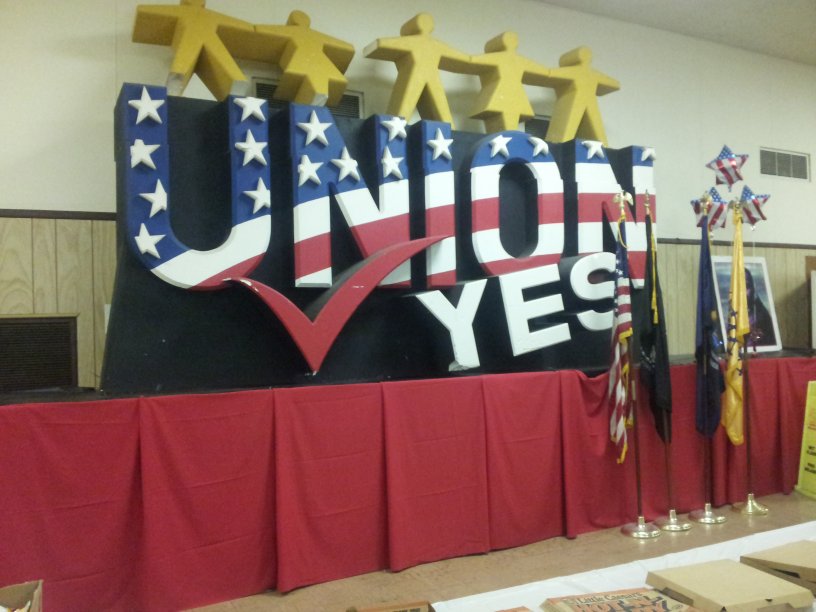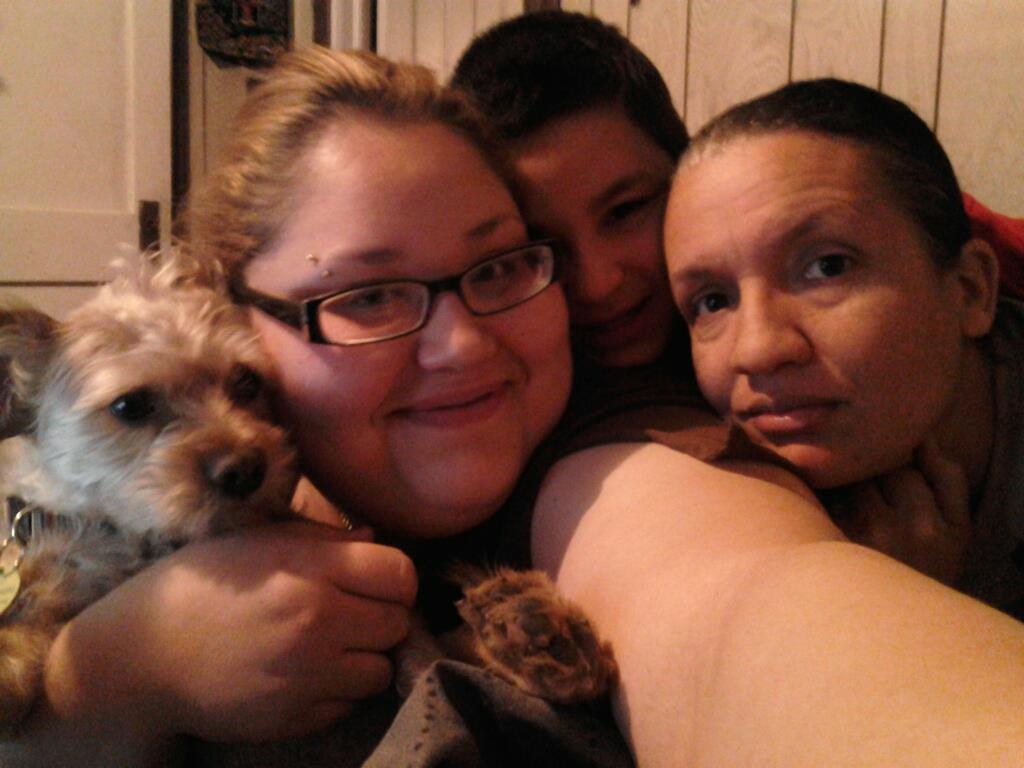A different dream for the American worker
By Sarah Cwiek

A different dream for the American worker
By Sarah CwiekMost people call Detroit a post-industrial city. But in the city of Dearborn, just a few steps outside southwest Detroit, is the Ford Motor Company’s Rouge plant. It’s still running—even if it now employs just a small sliver of the 100-thousand people it used to. And there, in its shadow, is UAW Local 600.
Robert Turner meets me in the parking lot of the union hall, because he’s the kind of gentleman who doesn’t want me to walk to my car alone. His story is one you come across a lot in Detroit. He has been a proud member of this local since 1967 and says the union gave an “average guy” like him a good life. Even though he’s retired from Ford now, he still comes down to the local a lot, just for the sense of community.
“When I came to Detroit in 1966, I was just a little ol’ Virginia country boy. And I started working at Ford, and I just met all my new family,” he says.
Traditionally, strong labor has helped close the gap between the wealthy and the poor, ensuring working class people have a path to stability. But labor isn’t as strong as it use to be in Detroit, or nationally.
Robert describes himself as a hopeful, “positive” guy who believes he’s a living example of the American Dream. But he’s a little concerned that younger generations don’t understand what the dream really is—and that they have to keep fighting for it.
“I think that sometimes that’s been our biggest problem. Because you get two TVs, two cars in the garage and a boat, and we get a little…relaxed. And we forget about the fight,” he says.
Inside Local 600, it’s clear things aren’t going all that great for this generation of American workers. At a pre-election voter education party, about 100 people are watching clips from a movie called “Heist: Who Stole the American Dream?”
The movie’s premise is that over the past 40 years, union-busting, deregulation, and other business-friendly government policies were part of an organized plot to undermine working Americans.
“This has been the greatest wealth transfer in the history of at least American-kind, if not mankind… This IS class warfare.” the movie declares.
Conspiracy theory-mongering? Perhaps. But while the causes are debatable, there are loads of evidence the American worker is faring poorly these days—at least, when compared to those at the top.
In case the movie wasn’t convincing enough, union leaders lay it out in charts when the film is done. Since the early 1980s, worker productivity has surged. So have corporate profits, now at an all-time high. In the meantime, worker’s wages as a percentage of GDP are at an all-time low.

Local 600 President Bernie Ricke says he knows how to strengthen the American economy once again.
“The only way we’re gonna rebuild the middle class in this country is to protect collective bargaining rights and organize more workers. It happened in the 1930s, and it’s gotta happen again.” says Bernie.
Bernie says unions need to assert themselves politically. On the national level, they want to re-elect President Barack Obama. In Michigan, they’re trying spending a lot of financial and political capital to support a change to the state constitution that would protect collective bargaining rights.
These big political battles have been preceded by years of smaller ones—most of which found labor on the losing end. For Local 600, that included a unionizing effort with a former auto supplier in southwest Detroit.
“The company just walked away in bankruptcy, they left everybody high and dry. We’ve stuck through the community through thick and thin,” says Bernie.
That was the Detroit—and the economy—25-year-old Jackie Buentello and others of her generation were born into.
Jackie is a third-generation resident of Detroit—Puerto Rican on her mom’s side, Mexican on her dad’s. She lives in a little house just on the other side of the freeway from where she grew up. The household also includes Iris, her girlfriend of four years, Iris’s 13-year-old son, and their two dogs.

Inside, Jackie is cooking a Puerto Rican pork roast.
“I’m just basting it. It should be almost ready, it’s been in for about three hours,” she says.
All this, despite how much she work at her two jobs. She’s a field coordinator for D-T-E Energy’s home energy consultation program. And more recently, she became the project lead on a similar program for businesses.
She and Iris are leasing this home to own at the moment. Jackie’s excited about that. She likes to do homey things, even if she’s not at home a lot. She’s particularly thrilled to have her own garden.
The yard is surrounded by high metal fencing, topped by barbed wire. It backs up to a gas station, where trucks idle in the parking lot, belching diesel fumes. The truck stop regularly attracts sex workers. And crime is prevalent in their neighborhood.
It’s been hard for Jackie and her siblings to rise above their surroundings. Many of her friends didn’t. Their education wasn’t great. There was constant pressure to side with one gang or the other. She watched friends get pregnant in the ninth grade—friends who now have three or four kids, and seem completely stuck in their dysfunctional environment.
Jackie’s mom, Carmen, is a social worker at a nearby Head Start. On a daily basis, she sees the many barriers that keep many people from getting ahead. But she’s also a strong believer in self-determination.
“The only way out of it is to educate yourself,” says Carmen.
“You can have a lot of environmental things that impact you. Life changes. Poverty. Race.. But you can choose to fold up, or you can choose to stand up.”
Carmen is really proud of Jackie. She says that in a way, the two of them grew up together.
Carmen was twenty-one when she had Jackie, the oldest of her four kids. Her husband, Raul, died of cancer in 2007. Things got rough, economically and emotionally. Jackie’s oldest brother got sucked into the gang life. He was locked up for attempted murder.
Fortunately, Carme says, the police figured out he didn’t do it, and Jackie’s brother was released. He learned from the experience, went to live with his grandparents, and has totally turned his life around. And the whole family pulled through. And for now, they’re both pretty happy with where they’re at.
“Jackie and I are kind of…wealthy. Compared to some of my peers, some of her peers. Definitely compared with some of her peers,” says Carmen.
And that, they all agree, is what makes for the good life—not just material wealth, though it’s nice to have that too. But family, friends—that’s the safety net you can really count on.
You can see Jackie’s story in one of two ways. Some people might see diminished expectations for the American Dream. Some emerging research shows that in wake of the Great Recession, people have lowered their expectations about what it means to get ahead.
But you can also see ways the ways in which people are re-orienting and re-defining the American Dream, and not necessarily for the worse.
In terms of the American Dream, Carmen says they are living it.
“Because I’m living much better than my parents. Jackie will live much better than me. That’s the American Dream.”
